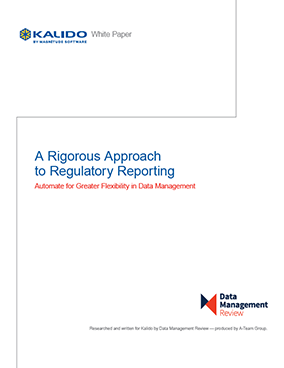Data Management Insight White Paper
The Reference Data Utility: How Goldman Sachs, JPMorgan Chase & Co and Morgan Stanley are breaking the reference data mold
The Reference Data Utility (RDU) built by SmartStream and backed by Goldman Sachs, JPMorgan Chase & Co, and Morgan Stanley is up and running and ready to deliver reference data management services to the banks. The concept of multi-tenant data utilities is not new, but none have achieved buy-in at the level of the RDU,...
Meeting the Data Challenge of AIFMD
The Alternative Investment Fund Management Directive (AIFMD) came into effect in 2013. Most financial institutions within its scope, particularly hedge funds and firms that service those funds, have since completed the majority of work required to meet their obligations under the regulation, but some thorny data management issues remain. Hedge funds are challenged by the...
Navigating BCBS 239 and the New Stress-Testing Regime
Rigorous stress testing – and emerging regulations like Basel’s BCBS 239 – mean that the risk and finance functions can no longer act in isolation. Regulators are increasingly seeking a true, holistic view of risk. To deliver on the new requirement, banks need to reinvent their infrastructures and operating models, making sure all elements of...
Tracking bonds for Solvency II’s Matching Adjustment
How are you tracking bonds that are eligible for Solvency II’s Matching Adjustment (MA)? With the January 2016 deadline looming, insurance companies and the asset managers that service them need to be able to identify eligible assets in their portfolio. But there’s no single list, rather a set of criteria to be followed, resulting in...
A Utility Approach for Operational Process Improvement
Data management is a high-cost, no-margin activity for financial institutions across the board. Business requirements and regulatory pressure demand more depth of processing and breadth of reporting than ever before. At the same time, high quality data sourcing, validation and enrichment are essential to achieving operational optimization. Yet most firms are reluctant to increase investment...
Getting to Grips with the Challenge of Beneficial Ownership
Understanding beneficial ownership of an entity – a corporation or a fund – has emerged as a key element of many financial institutions’ compliance activities. A raft of relatively new regulations – ranging from the US Dodd-Frank Act through to Russian sanctions – require firms to understand who owns the entities they do business with,...
Solvency II How Insurers, Asset Managers and Asset Servicers are Meeting the Data Challenge
The EU’s Solvency II regulation is due to come into effect in January 2016. Aimed at ensuring the insurance industry fully understands the risks associated with its investments, the regulation places great emphasis on access to highly granular valuations and risk information. For most insurers, this is the first time they have been required to...
BCBS 239: An Urgent Call to Overhaul Risk Data Management
BCBS 239 is a wide ranging regulation including 14 principles spanning risk data aggregation and reporting, IT infrastructure, and data governance. Implementation can provide significant business benefits, including an enterprise-wide view of risk, but the task is not without difficulties as banks face data management challenges such as data silos, legacy systems and poor data...
Solving the Operational Risk Management Puzzle
Operational risk management has emerged as a major challenge as a slew of regulations affecting financial institutions across the board – from universal banks to insurance companies and their asset servicers – aims to boost transparency in order to mitigate systemic risk. The emerging regulations are emphasizing data governance and requiring firms to ‘show their...
A Rigorous Approach to Regulatory Reporting
The current battery of regulations is putting the onus on financial firms to review their data collection, integration and management systems that underlie their regulatory report processes today. For many firms – whether they are asset owners, fund managers, investment banks or custodians – the new emphasis on transparency is exposing gaps in their ability...











